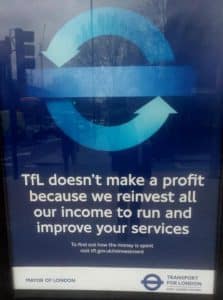Today there was a minor social media storm over a billboard that TfL had commissioned at a total cost of nearly £100k (I’m clearly pitching to the wrong businesses).
The poster contained the headline “TfL doesn’t make a profit because we reinvest all our income to run and improve your services”. Grammar pedants on social media were quick to react, pointing out that the singular “doesn’t” conflicts with the plural “we”.

Bad grammar, but good copy.
Technically, they could have also pointed out the lack of punctuation: a possibly missing comma after ‘profit’ and a definitely missing full stop at the end.
But consider the “correct” alternatives:
“TfL doesn’t make a profit because it reinvests all its income to run and improve your services.”
“TfL don’t make a profit because they reinvest all our income to run and improve your services.”
“TfL don’t make a profit because we reinvest all our income to run and improve your services.”
Do any of those sound better to you? Probably not and here is why: the first two create a sense of distance, and remove the personal element. TfL is turned into a faceless organisation that you are unlikely to want to engage with. Note the deliberate use of “your” – this is to create a connection with you, the reader. This bond is broken if you feel you are being spoken to by an impersonal thing.
The third option keeps the personal, but creates a sense of dissonance because we are not used to thinking of organisations in the plural. Giving something a name (TfL) automatically gets us thinking in the singular, regardless of how many people TfL represents.
The important bit is that TfL chose the best solution for getting the message across. They needed to consider their audience (people unlikely to feel much affection for TfL) and the environment (fast moving crowds in stations). Anything that interfered with the message would have been bad copy, regardless of how ‘correct’ it was.
If you look hard, you will find plenty of examples of grammatically incorrect copy that still does an excellent job of communicating, whether it’s the “10 items or less” tills at Tesco, or my use of “but” to start a new paragraph in this article.
Basically, it’s fine to break rules if it helps your message. Just be careful to avoid any mistakes that are going to distract from the message. Spelling mistakes are a definite no. So are awkward sentences, or using language that isn’t appropriate for your audience.
The rules you MUST follow are:
• Focus on the message
• Write for your audience
• Write for the environment
And don’t worry about the grammar pedants!
One final thought: according to the Evening Standard article, the TfL campaign was a three year campaign that was coming to its end. Now it could just be that the social media controversy was engineered to give the campaign a final boost. People love sharing marketing “mistakes” nearly as much as they love sharing funny cats. If my suspicions are true, this is an excellent example of social media marketing and the creative agency fully deserved their £100k.
At msgworks.com we can write great copy for you and it will cost a lot less! Get in touch for a FREE quote.

